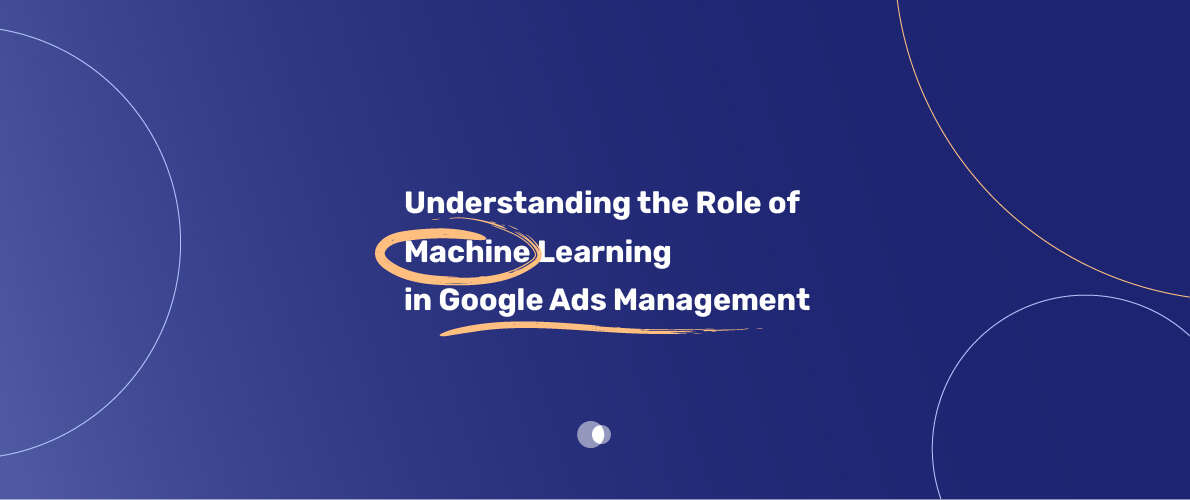Machine Learning is changing AdWords Management. It helps businesses analyze lots of data to boost ad performance. This leads to better returns on investment.
Table of Contents
Using Machine Learning in Google Ads management is key. It automates and optimizes ad campaigns. This means ads can target better and bid smarter. It’s vital for businesses to stay ahead online.
By using Machine Learning, businesses can make Google Ads Management better. It makes ads more efficient and effective. Machine Learning helps make decisions based on data, improving ad performance and boosting conversions. Partnering with an experienced AdWords agency ensures your business leverages AI-powered tools to maximize ROI and stay competitive in the digital space.

Introduction to Machine Learning in Google Ads
As digital advertising gets more complex, Machine Learning in Google Ads Management is more important. It unlocks better AdWords optimization, helping businesses fine-tune their campaigns automatically. This leads to higher performance, smarter targeting, and ultimately, more revenue from every ad spend.
Key Takeaways
- Machine Learning is essential for effective Google Ads Management
- Machine Learning algorithms can analyze vast amounts of data to improve ad performance
- Ad Optimization is crucial for businesses to stay competitive in the digital market
- Machine Learning enables businesses to make data-driven decisions
- Machine Learning can lead to improved ad performance and increased conversions
- Google Ads Management can be automated and optimized using Machine Learning
The Evolution of Google Ads: From Manual to Machine Learning
The Google Ads Evolution has seen big changes over time. It moved from manual management to using machine learning. This change has made ad management better and more precise, helping businesses reach their audience more effectively. Machine learning has been key in this shift towards Automation.
As Google Ads grew, the need for Automation became clear. Old ways of managing Google Ads couldn’t optimize campaigns well. Machine learning has changed this, allowing businesses to automate parts of their campaigns and see better results.
Key Benefits of Machine Learning in Google Ads
- Improved ad targeting and personalization
- Enhanced campaign optimization and automation
- Increased efficiency and reduced manual effort
The move to machine learning in Google Ads was to make ad management better. Machine learning helps businesses analyze data and make smart decisions about their ads. This has helped businesses get a better return on investment and meet their marketing goals. The shift to machine learning has been crucial in the Google Ads Evolution, helping businesses stay competitive and meet their marketing goals.
Core Components of Machine Learning in Google Ads Management
Machine learning is key in Google Ads management. It helps advertisers make their campaigns better. The main Machine Learning Components are algorithms that learn from data and adjust bids in real-time. This leads to better ad targeting and more return on investment (ROI).
At the core of Algorithmic Learning in Google Ads are complex systems. They analyze user behavior and ad performance to predict conversions. This helps advertisers create ads that really speak to their audience.
To get the most from Google Ads, understanding Machine Learning Components is crucial. By using Algorithmic Learning in ad management, businesses can outdo their rivals and hit their marketing targets.
Some big pluses of using Machine Learning Components in Google Ads are:
- Improved ad targeting and relevance
- Enhanced campaign performance and ROI
- Increased efficiency in ad management and optimization
How Machine Learning Transforms Bidding Strategies
Machine learning has changed how businesses bid in Google Ads. It uses Machine Learning Bidding to make smart decisions. This way, companies can optimize their bids and get better ad visibility.
Smart Bidding is a big part of this. It uses machine learning to adjust bids in real-time. This ensures bids stay competitive and meet marketing goals. Techniques like target CPA, ROAS, and ECPC bidding are used.
- Target cost per acquisition (CPA) bidding
- Target return on ad spend (ROAS) bidding
- Enhanced cost per click (ECPC) bidding
These methods help improve ad performance and increase ROI. The table below shows the clear benefits of machine learning in bidding.
| Bidding Strategy | Benefits |
| Smart Bidding | Improved ad visibility, increased conversions, and better ROI |
| Automated Bid Adjustments | Real-time bid optimization, reduced manual effort, and improved bidding accuracy |
Machine Learning’s Impact on Ad Creation and Testing
Machine Learning is changing how businesses make and test ads. It uses algorithms to create ads that people like, predict how well ads will do, and make testing easier. This saves time and money and makes ads more effective.
Some benefits of using Machine Learning in Ad Creation and Ad Testing include:
- Personalized ad content that increases engagement and conversion rates
- Predictive analytics that help optimize ad performance and reduce costs
- Automated ad testing that saves time and resources
Companies like Google and Facebook are already using Machine Learning to improve their ads. By using Machine Learning, businesses can stay ahead and get more value from their ad spending.

As Machine Learning gets better, we’ll see new ways it helps with ads. It can look at lots of data and make smart guesses. This could really change the advertising world.
| Ad Creation and Testing Process | Traditional Approach | Machine Learning Approach |
| Ad Content Generation | Manual creation by humans | Automated generation using Machine Learning algorithms |
| Ad Testing | Manual testing and optimization | Automated testing and optimization using predictive analytics |
Audience Targeting Through ML Algorithms
Machine learning algorithms have changed how businesses target their audience in Google Ads. They can now find their perfect audience with great accuracy. Audience targeting is key to a successful Google Ads campaign, and ML algorithms are essential. They help businesses analyze data to spot patterns and trends for better targeting.
ML algorithms help businesses see patterns, segment their audience, and make smart decisions. This leads to more effective ads, higher conversion rates, and better returns. For example, predictive analytics can predict user behavior, like what they might buy or who they are, to show ads that really speak to them.
- Ads are more relevant, leading to more engagement and sales
- Businesses get deeper insights into their customers, improving their strategies
- ML algorithms make the targeting process more efficient, saving time and effort
By using ML algorithms and predictive analytics, businesses can target their audience more precisely. This leads to more successful Google Ads campaigns.
Performance Metrics and ML-Driven Insights
To check if Google Ads campaigns are doing well, it’s key to watch important performance metrics. Machine learning gives us ML-Driven Insights into these metrics. This helps businesses understand their Ad Performance and make smart choices to boost it.
Some important performance metrics to keep an eye on include:
- Conversion rates
- Cost per conversion
- Return on ad spend (ROAS)
- Click-through rates (CTR)
By looking at ML-Driven Insights, marketers can spot where to improve and tweak their campaigns for better ROI. For example, metrics like CTR and conversion rates help refine ad targeting and creative to connect better with the audience.
By using ML-Driven Insights and tracking key Performance Metrics, businesses can unlock their Google Ads campaigns’ full potential. This leads to more conversions, revenue, and growth for the business.
| Metric | Description |
| Conversion Rate | The percentage of users who complete a desired action |
| Cost per Conversion | The cost of each conversion |
| Return on Ad Spend (ROAS) | The revenue generated by each ad spend |
Implementing Machine Learning in Your Google Ads Strategy
Machine learning can greatly improve your Google Ads performance. It automates and optimizes your Google Ads strategy. This leads to better campaign efficiency and higher ROI.
To start using machine learning, you need to set up ML-powered campaigns. You must pick the right machine learning model for your goals. It’s crucial to regularly check and tweak these settings for the best results.
Setting Up ML-Powered Campaigns
- Choose a suitable machine learning model for your advertising goals
- Configure the necessary parameters, such as bid strategies and targeting options
- Monitor and adjust parameters regularly to optimize performance
Best Practices for ML Integration
To get the most out of machine learning in Google Ads, follow best practices. This means always checking how your ML campaigns are doing. Use this data to make smart choices and improve your campaigns.
| ML Integration Best Practices | Description |
| Regularly review campaign performance | Monitor key metrics, such as click-through rates and conversion rates, to identify areas for improvement |
| Adjust ML parameters as needed | Make data-driven decisions to optimize campaign performance and achieve advertising goals |
| Stay up-to-date with the latest ML developments | Continuously educate yourself on the latest machine learning trends and best practices to stay ahead of the competition |
Common Challenges and Solutions in ML-Based Ad Management
Using machine learning in Google Ads management can be tough. Businesses often face Common Challenges that slow down their ad campaigns. One big issue is the complexity of ML-Based Ad Management systems. These can be hard to handle for those without a lot of technical know-how.
To tackle these problems, businesses can look for Solutions that make managing ML-based ad campaigns easier. They might partner with a digital marketing agency that knows ML-based ad management well. Or, they could invest in software that makes creating and optimizing ad campaigns simpler.
Some common challenges and their solutions include:
- Data quality issues: Ensuring that high-quality data is used to train ML models
- Model complexity: Selecting ML models that are appropriate for the business’s specific needs
- Campaign optimization: Continuously monitoring and adjusting ad campaigns to ensure optimal performance

By knowing the common challenges of ML-Based Ad Management and finding good Solutions, businesses can make the most of machine learning in Google Ads management. This can lead to better success in their digital marketing.
Future Trends in Machine Learning for Google Ads
Looking ahead, Machine Learning will be key in shaping Google Ads. Trends like automation and artificial intelligence are growing. Advertisers need to keep up to stay competitive.
Machine Learning in Google Ads has already made big improvements. We’ll see even more cool uses of Machine Learning soon.
Emerging Technologies
New tech like natural language processing and computer vision are coming to Google Ads. They’ll help target ads better, making campaigns work harder.
Predicted Industry Changes
The future of Machine Learning will change Google Ads a lot. Here are some expected changes:
- More automation in ad management
- More focus on data-driven decisions
- More emphasis on user experience and ad relevance
Preparing for Future Developments
To get ready for these changes, advertisers should learn about Machine Learning in Google Ads. They should keep up with the latest trends and advancements.
Real-World Success Stories and Case Studies
Many businesses have seen big wins by adding machine learning to their Google Ads. These Success Stories show how machine learning can boost ad results and ROI. By looking at Case Studies, marketers can pick up tips from successful companies.
Companies in e-commerce and finance have led the way with machine learning in Google Ads. They’ve used algorithms to fine-tune targeting, bidding, and ad design. This has greatly improved their Google Ads outcomes.
Marketers can learn a lot from these Success Stories and Case Studies. They show how to use machine learning to analyze big data, spot trends, and make smart ad choices. This can lead to better ad performance.
| Business | Industry | Machine Learning Strategy | Results |
| Company A | E-commerce | Ad targeting optimization | 25% increase in conversions |
| Company B | Finance | Bidding strategy optimization | 30% decrease in cost per acquisition |
Using machine learning in Google Ads can give businesses a big advantage. By studying Success Stories and Case Studies, marketers can apply these strategies to their own campaigns. This can lead to impressive results.
Conclusion: Maximizing Your Google Ads ROI with Machine Learning
Machine learning has changed how businesses manage Google Ads. It uses AI to make ad campaigns better, leading to more money back and smarter marketing.
Machine learning helps with better bidding, targeting, and insights. It’s key in today’s Google Ads world. By using these tools, you can get better results and beat your rivals.
To get the most from Google Ads with machine learning, keep trying new things and improving. Keep up with trends and use data to make choices. With the right tools, you can grow and make more money.
FAQs
What is the role of machine learning in Google Ads management?
Machine learning helps Google Ads by analyzing lots of data. This leads to better ad performance and ROI for businesses. It makes targeting and bidding more precise and automates ad campaigns.
How has the evolution of Google Ads shifted from manual to machine learning-based management?
Google Ads used to be managed manually, but now it’s all about automation and machine learning. This shift makes ad management more efficient and effective. It helps businesses reach their target audiences better.
What are the core components of machine learning in Google Ads management?
Machine learning in Google Ads involves algorithms learning from data and making predictions. They adjust bidding strategies in real-time to improve ad performance. Understanding these components is key to using machine learning well in Google Ads.
How does machine learning transform bidding strategies in Google Ads?
Machine learning changes bidding strategies by using smart mechanisms and automated adjustments. It optimizes performance. This ensures bids are competitive and meet marketing goals, improving ad visibility and conversion rates.
What is the impact of machine learning on ad creation and testing in Google Ads?
Machine learning helps in creating ad content and predicting performance. It streamlines the testing process. This reduces time and resources, while improving ad effectiveness.
How do machine learning algorithms enhance audience targeting in Google Ads?
Machine learning algorithms recognize patterns and segment audiences dynamically. They use predictive analytics to show ads to the most relevant people. This increases conversion chances.
How can machine learning provide insights into Google Ads performance metrics?
Machine learning offers insights into key performance metrics. It helps businesses understand their ad performance and make better decisions. By analyzing these insights, marketers can improve their campaigns for better ROI.
What are the best practices for implementing machine learning in a Google Ads strategy?
To implement machine learning in Google Ads, set up ML-powered campaigns and monitor parameters. Follow integration guidelines to use machine learning effectively.
What are some common challenges and solutions in ML-based Google Ads management?
Challenges include data quality, algorithm transparency, and workflow integration. To overcome these, manage data well, increase algorithm clarity, and adopt a strategic approach to integration.
What are the future trends in machine learning for Google Ads?
Future trends include natural language processing and computer vision for better ad creation and targeting. Automation, predictive analytics, and personalization are expected. Businesses should stay updated and prepare their strategies.



